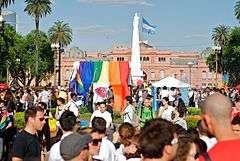LGBT culture in Argentina
The history of LGBT culture in Argentina can be traced back to the indigenous, who possessed a third gender called weye, gave equal treatment to male, female, transgender and intersexual people, and had a wide diversity of sexual practices.[1][2][3] During the colonial period, homosexuality was punished for being considered unnatural and contrary to the Christian God, and the "sodomy" of the Mapuche people was used as a justification for war. Since its independence, Argentina followed the trend of moral, medical and psychiatric repression that characterized Western culture in general. The 1960s and early 1970s saw the emergence of the first LGBT social movements and rights organizations in the country—which were pioneering in Ibero-America—including Nuestro Mundo (English: Our World) in 1967 and the Frente de Liberación Homosexual (English: Homosexual Liberation Front) in 1972. The 1976 military dictatorship eradicated the movement and many of its members were forcedly disappeared. With the return of democracy in 1983, a new LGBT movement emerged in the country, with important advancements during the 1990s.

In 2010, Argentina became the second in the Americas, and the tenth in the world to legalize same-sex marriage. Transgender rights in Argentina are among the most advanced in the world: its Gender Identity Law, passed in 2012, made Argentina the "only country that allows people to change their gender identities without facing barriers such as hormone therapy, surgery or psychiatric diagnosis that labels them as having an abnormality".[4][5] BBC Mundo reported in 2014 that "Argentina leads the trans revolution in the world",[6] and in 2015 the World Health Organization cited Argentina as an exemplary country for providing transgender rights.[5] In Pew Research Center's 2013 Global Attitudes Survey, Argentina was the South American country with the most positive societal attitudes towards homosexuality, with about three-quarters (74%) of those surveyed saying it should be accepted.[7] The country's capital and largest city, Buenos Aires, has become an important recipient of LGBT tourism since the early 2000s,[8] and has been described as "Argentina gay capital".[9][10]
See also
| Wikimedia Commons has media related to LGBT in Argentina. |
- LGBT rights in Argentina
- Intersex rights in Argentina
- Same-sex marriage in Argentina
- Queer Tango
- Argentine LGBT+ Cinema
References
- Núñez de Pineda y Bascuñán, Francisco (1863) [1673]. Cautiverio feliz, y razón individual de las guerras dilatadas en el reino de Chile (in Spanish). 3. Santiago: El Ferrocarril. pp. 107 and 159. Retrieved December 11, 2017.
- Bacigalupo, Ana Mariella (2011). "El hombre mapuche que se convirtió en mujer chamán: Individualidad, transgresión de género y normas culturales en pugna" (PDF). Scripta Ethnologica (in Spanish). National Scientific and Technical Research Council. XXXIII: 9–40. ISSN 1669-0990. Retrieved December 11, 2017.
- Bacigalupo, Ana Mariella (2004). "Rituales de género para el orden cósmico: luchas chamánicas mapuche por la totalidad" (PDF). Scripta Ethnologica (in Spanish). National Scientific and Technical Research Council (26): 9–38. ISSN 1669-0990. Retrieved December 11, 2017.
- "Argentina OKs transgender rights: ID changes, sex-change operations and hormone therapy". 9 May 2012. Archived from the original on 31 March 2019. Retrieved 11 December 2017.
- Lahrichi, Kamilia; La Valle, Leo (4 April 2016). "Argentina's Field of Dreams for the LGBT". U.S. News & World Report. U.S. News & World Report L.P. Retrieved 22 November 2016.
- de los Reyes, Ignacio (16 May 2015). "Por qué Argentina lidera la revolución trans en el mundo". BBC Mundo. Retrieved 12 May 2017.
- "The Global Divide on Homosexuality" (PDF). Pew Research Center. 4 June 2013. Archived from the original (PDF) on 2015-02-18. Retrieved 8 December 2014. Cite journal requires
|journal=(help) - "La nueva meca del turismo gay". La Nación (in Spanish). March 5, 2006. Retrieved December 11, 2017.
- Haljuci, Rusha (24 August 2010). "Q&A: Gay-Friendly Spots in Buenos Aires". The New York Times. The New York Times Company. Retrieved 29 December 2015.
- Santagati, Adriana (1 November 2003). "Buenos Aires, nueva capital del turismo gay de Sudamérica". Clarín. Clarín Group. Archived from the original on 2016-01-05. Retrieved 29 December 2015.
External links
- Argentine Federation of Lesbians, Gays, Bisexuals and Trans (Spanish: Federación Argentina Lesbianas, Gays, Bisexuales y Trans; FALGBT)
- Homosexual Community of Argentina (Spanish: Comunidad Homosexual Argentina; CHA)